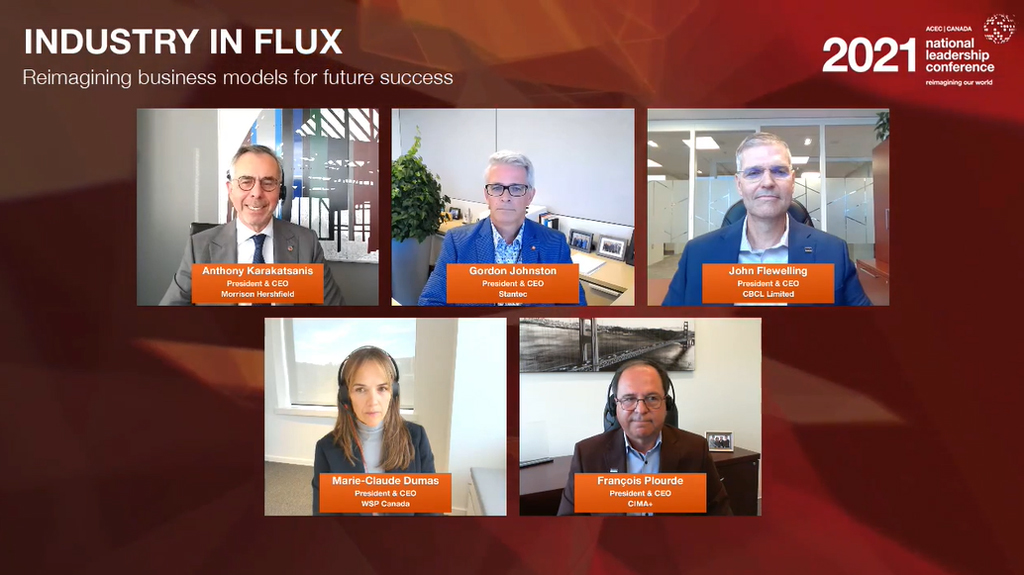The engineering industry is poised for massive growth and change in the coming years and the firms that can adapt now will be most successful, executives say.
A panel of engineering leaders at this year’s Association of Consulting Engineering Companies – Canada National Leadership Conference explored what the future may bring for consulting engineering firms.
Gordon Johnston, Stantec president and CEO, believes the next few years will bring massive growth to the industry. The economy will continue to come back and stimulus money will flow, he said.
However, many of the reductions in travel and entertainment expenses firms saw during the pandemic could come creeping back. There will also be stiff competition for labour, especially new young talent that is more environmentally and socially conscious than other generations.
In terms of technology, Johnston explained Stantec is focused on internal ways to increase efficiency and external ways to provide new value to clients. Internally that means using better tools to digitize and streamline the design process and externally the firm has been developing social media survey analytics and asset management tools.
However, Johnston noted as firms become able to do work fast, the billable hours model will have to be rethought,
“Most of us still have that model of billing by the hour but if design gets faster, not only are we spending thousands to get those systems in place, but it will mean we are billing fewer hours,” he said.
“Over time we will have to rethink billing models.”
Going forward, Johnston said the industry also needs to embrace more progressive contract models that encourage collaboration rather than competition. He explained the pendulum of risk over the years has swung so far over towards contractors and consulting engineers that Stantec actively avoided certain clients or teams that it deemed too litigious.
“I like the idea of progressive design-build and Integrated Project Delivery (IPD),” he said. “It makes sense. It’s a bunch of people working together to achieve an outcome. We can put our energy and creativity into doing good work. I believe it is the way of the future.”
In terms of vaccine mandates, Johnston said Stantec has begun the process of mandating them as many major clients, including the U.S. government, have made it a requirement. The difficult part will be how firms adjudicate exemptions for religious or medical reasons.
Marie-Claude Dumas, president and CEO of WSP Canada, explained the amount of work the consulting engineering sector can take on in the coming years will only be limited by the amount of qualified people around to do it. The industry will need to continue its focus on resilient and sustainable design.
“It’s not just about building assets,” said Dumas. “We have to do this in a sustainable and resilient way. That has to be at the heart of who we are as engineers.”
Dumas added going forward, she intends to continue providing flexibility for employees that was made necessary during the pandemic. The firm also raised its ceiling on mental health and wellness benefits as demand skyrocketed. She explained not only is it the right thing to do, but it will be a huge part of attracting and retaining employees going forward.
“Employees, especially younger ones, want to work for a firm with a purpose,” said Dumas, highlighting EDI (equity, diversity, inclusion) and ESG (environmental, social, governance) efforts as a top priority.
She also found during exit interviews that many employees were leaving for career path opportunities, something that companies must begin to provide.
“A career is not just a ladder where you take your boss’s job,” said Dumas. “It’s more like a metro map. People want broader experiences. That is valuable for the employee and the firm as well.”
Dumas noted that popular models like P3 and design-build are beginning to hinder collaboration and she endorsed exploring new models like IPD.
“P3 is tough to collaborate and innovate on because it is so prescriptive,” said Dumas.
John Flewelling, president CEO of CBCL limited, brought the perspective from a smaller Atlantic-based firm. He believes the recipe for successful projects going forward will be clarity around the deliverables.
“When we sit with clients and have clear project scopes and responsibilities it is a recipe for a successful project,” said Flewelling. “Early project risk assessments, value engineering assessments, all that provides clarity and aligns objectives.”
He added budgets should allow for bringing in subject matter experts into projects early to review designs.
His experience in Atlantic Canada has been with fewer large-scale projects and a reliance on strategic partners to bolster teams.
“It’s all about volleying risk and putting it in the hands of who can handle it best,” he said, adding that IPD is a possible solution and participants need to be educated about it.
“If we have clients that understand this we can have some really successful projects,” he said.
Follow the author on Twitter @RussellReports.











Recent Comments
comments for this post are closed